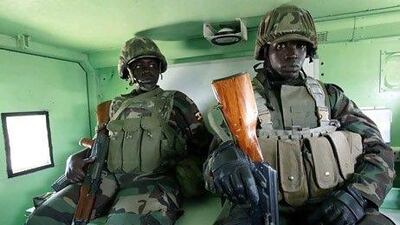The departure of Col Muammar Qaddafi from international affairs may be welcomed by many, but in Africa, the man - or at least his open wallet - will be missed.
More Business news: Editor's pick of today's content
Gulf to help EU as Syrian oil banned Nations in the Gulf are ready to replace Syrian oil supplies as fresh EU sanctions come into effect. Read article
$300 million Las Vegas tower in peril MGM Resorts International wants to demolish a partially-completed tower on the Las Vegas strip. The developer says structural defects in the project, co-developed with Dubai World, are beyond repair. Read article
Sanctions cloud Syria's big plans Industry Insights: Syria had been gunning for a boom in energy investment, but growing international sanctions on the Assad regime threaten those plans.. read article
Abu Dhabi ranks 24th in prices as hotel room rates decline The emirate falls in the rankings of the world's most expensive cities for hotels, according to a new survey. Read article
For years, African leaders have taken his money with one hand, while hiding their giggles at his antics behind the other. Despite his eccentricities, Col Qaddafi has been a driving force behind the African Union (AU) and many other initiatives on the continent.
His money has paid for the continent's only home-grown, pan-African radio station and its first dedicated satellite. But it is through the AU that Col Qaddafi made his presence felt throughout Africa.
The AU was founded in 2003, at the instigation of Libya, to provide a pan-African voice in a post-Cold War world. Up to now, Libya has paid 15 per cent of the AU's budget. Most of the 53 members cannot, or will not, pay their dues, and Libya's contribution will now have to be met by Egypt, South Africa and Nigeria, which jointly contribute the bulk of the funding.
The absence of Libyan money could be significant. Some 30,000 AU troops are involved in peacekeeping missions in Somalia and Sudan. These deployments may now be in jeopardy and might have to be drastically cut back.
Other key AU projects are also in doubt. The US$30 billion (Dh110.19bn) of Libyan funds now frozen by the West would have contributed significantly to the African Investment Bank, in Sirte, which the AU hoped would gradually supplant the World Bank as a major lender on the continent.
Ditto the planned African Monetary Fund that had secured pledges of $42bn, much of it from Libya, intended to squeeze out the unloved IMF. A third finance institution, the African Central Bank (ACB), based in Abuja, Nigeria, was a particular pet project of Col Qaddafi's.
The ACB was central to his dream of an African EU, with its own currency. This, he declared, would end the dominance of the dollar and euro across the continent. Without Col Qaddafi's tacit backing, the survival of the ACB is now in doubt.
It is not just institutions that have benefited from Col Qaddafi's deep pockets. Tanzania, Mozambique, Ethiopia and Sudan have each taken loans in excess of $100 million in recent years. Sudan has received as much as $610m, according to Libyan foreign ministry figures.
Even calling this money a loan may be a stretch, as the colonel did not seem in a hurry to get it back. But this could change. The new Libyan authority may be less indulgent and demand that the funds be repaid.
At the same time, other beneficiaries of Libya's largesse, such as Liberia, may in turn hold the new authority to account. In the 1990s, Col Qaddafi was the main backer of bloodthirsty warlords such as Charles Taylor and Foday Sankoh, who ran amok in West African countries for years, killing more than 1 million people.
Once the warlords were killed or incarcerated in The Hague, these countries demanded that Libya make Versailles-style reparations. By 2000, Col Qaddafi was open to the idea, as he began rebuilding his relationship with the West, and tried to advance his vision of himself as "brother leader" of Africa.
So he showered millions of dollars on postwar Liberia, sponsoring agricultural projects and renovating a five-star hotel in the capital, Freetown. He even helped to bankroll the country's presidential elections.
Still, there is only so much forgiveness money can buy: Liberia was one of the first African countries to sever ties with Col Qaddafi this year. His relationship with the rest of the continent is no less complex. Col Qaddafi had himself crowned "King of Kings" at a ceremony at the AU headquarters a few years ago, an event that included praise singers and a gold crown.
His departure from the African stage is not likely to end Libya's complicated relationship with Africa. The AU has held out on recognising the rebel government, citing the killing of black workers mistaken for mercenaries. And the new government is likely to remember the ambivalence of the AU in recognising its struggle against a tyrant.
It seems likely, therefore, that Col Qaddafi's poisoned legacy will survive for some time to come, even if his grandiose projects do not.

